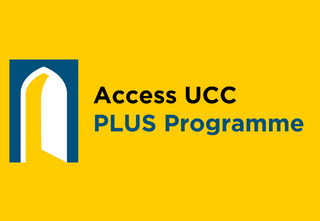The UNIC website uses cookies to improve your experience. Read our full Cookie Policy here.
This case study details the creation of a bespoke system of support for students from underrepresented groups as they transition from Secondary into Further Education, with the aim of providing greater support to continue into Higher Education in Cork city.
Date
Partners

Access UCC launched a new support programme for transition from Further Education (FE) to Higher Education (HE) in November 2019. Access UCC PLUS Programme, in collaboration with the Cork Education and Training Board (ETB), provides support directly within the Further Education sector to students originating from UCC-linked DEIS schools and certain other centres. The initiative is a response to the high number of students from these schools and centres progressing to FE rather than directly into HE, and it aims to increase the number of these students who may then progress from FE to HE. The target cohort must be aged under 23 (after which they are classed as mature students) and it also includes Cork city and county Youthreach centres, Cork Life Centre and members of the Traveller and Roma community.
There are two aspects to the programme: pre-entry engagement delivered through outreach activities in schools; and post-entry support for students once they are attending one of the three city campuses of the Cork College of Further Education.
Pre-entry activities include visits to second-level schools, linked centres and Youth Reach as well as engagement with Traveller interagency groups to deliver talks to 5th and 6th year students (Leaving Certificate students). Activities also include attendance at parents talks, career events and facilitating visits to FE campuses by prospective students.
Post-entry activities include a welcome and induction social activity, one-to-one personal meetings, the provision of academic support, supplementary study, study skills resources and financial assistance (in the form of vouchers). They also include facilitating a Traveller/Roma assistance fund, providing support in accessing information, decision-making and in completing the application process for HE through the CAO and HEAR.
In the three years of the initial pilot phase, the programme was successful in promoting progression pathways for students from FE to HE. It also raised the profile and awareness of these options among FE and HE staff, students, parents and the community stakeholders. During this time, students submitted feedback via evaluation surveys and research was also undertaken by university post-doctoral research staff.
Research and Evaluation
Research findings indicate that the overwhelming response to the ACCESS+ programme was a positive one, with research participants pointing to the benefits of the guidance and support they received – particularly regarding the one-to-one support meetings when trying to navigate their new college environment. Students reported a reduction in the challenges and stress of navigating the further education space and highlighted the benefits to their mental health as well as overall enjoyment of the college experience. Students who were interested in progressing to Higher Education valued and benefited from the support in this area. Initiatives included online talks from Access staff in UCC, as well as in-person events such as the QQI to Quad visit, which saw 50 FE students tour UCC and meet relevant support staff. (*QQI is the awarding body in FET, and the Quad in UCC is the central area of the University).
Collaboration
The Access UCC initiative operates within the colleges and is a unique collaboration between stakeholders. Operations are conducted by the coordinator and the programme is managed by Access UCC’s PLUS programme manager, with oversight and guidance provided by a Steering Group of stakeholders. This group includes second-level Guidance Counsellors and Principals, the Cork ETB Further Education Director and staff, Principals from the FET Colleges and the Head of Access UCC.
As a result of these findings and the overall positive response, this pilot project has now been extended and approval has been granted for the recruitment of a second officer.
Student accounts of their experience of FE support
Further information on Access UCC’s FE to HE Transition Support Programme is available here.
UNIC Superdiversity Academy